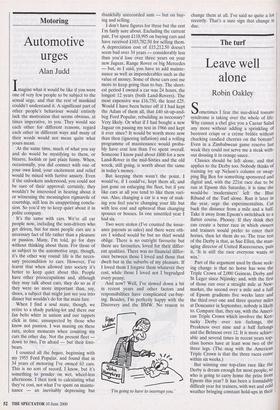Motoring
Automotive urges
Alan Judd
Imagine what it would be like if you were one of very few people to be subject to the sexual urge, and that the rest of mankind couldn't understand it. A significant part of other people's behaviour would entirely lack the motivation that seems obvious, at times imperative, to you. They would see each other for different reasons, regard each other in different ways and many of their words would not mean quite what yours mean.
At the same time, much of what you say and do would be mystifying to them, or bizarre, foolish or just plain funny. When, occasionally, you did connect with one of your own kind, your excitement and relief would be mixed with furtive anxiety. Even if the onlookers understood, you could not be sure of their approval; certainly, they wouldn't be interested in hearing about it or witnessing the meaningless rigmarole of courtship, still less its unappetising conclu- sion. So you'd try to keep quiet about it in polite company.
It's the same with cars. We're all car people now, including the non-drivers who get driven, but for most people cars are a necessary fact of life rather than a pleasure or passion. Many, I'm told, go for days without thinking about them. For those of us subject to the automotive urge, though, it's the other way round: life is the neces- sary precondition to cars. However, I've learnt that when allowed into society it's better to keep quiet about this. People have other preoccupations and, although they may talk about cars, they do so as if they were no more important than, say, shoes, a subject that might just see you into dinner but wouldn't do for the main fare.
When I find a soul mate, though, we retire to a shady parking-lot and there our fan belts whirr in unison and our tappets click in time, unsuspected by those who know not passion. I was musing on these rare, stolen moments when counting my cars the other day. Not the present fleet down to two, I'm afraid — but their fore- bears.
I counted all the begats, beginning with my 1955 Ford Popular, and found that in 34 years of motoring I've owned 63 cars. This is no sort of record, I know, but it's something to ponder on wet, wheel-less afternoons. I then took to calculating what they've cost, not what I've spent on mainte- nance — an inevitably depressing but thankfully unrecorded sum — but on buy- ing and selling.
I don't have figures for three but the rest I'm fairly sure about. Excluding the current pair, I've spent £118,995 on buying cars and have received £103,782.50 for selling them. A depreciation cost of £15,212.50 doesn't seem bad over 34 years — considerably less than you'd lose over three years on your new Jaguar, Range Rover or big Mercedes — but, as I said, you have to add mainte- nance as well as imponderables such as the value of money. Some of those cars cost me more to keep going than to buy. The short- est period I owned a car was 24 hours, the longest 12 years (both Land-Rovers). The most expensive was £16,750, the least £25. Would I have been better off if I had kept the Adam of them all, that £40 sit-up-and- beg Ford Popular, rebuilding as necessary? Very likely. Or what if I had bought a new Jaguar on passing my test in 1966 and kept it ever since? It would be worth more now than then (ignoring inflation) and a rolling programme of maintenance would proba- bly have cost less than I've spent overall. Someone I know paid about £800 for a new Land-Rover in the mid-Sixties and the old wreck, still going, is worth about the same in today's money.
But keeping them wasn't the point. I would've, if I could've, kept them all, and just gone on enlarging the fleet, but if you like cars at all you tend to like them vari- ous. Also, changing a car is a way of mak- ing you feel you're changing your life but with less cost and upheaval than changing spouses or houses. In one unsettled year I had six.
Two were stolen (I've counted the insur- ance payouts as sales) and there were oth- ers I wished would be but no thief would oblige. There is no outright favourite but there are favourites, loved for their differ- ent qualities. There was no financial differ- ence between those I loved and those that dwelt but in the suburbs of my pleasure. If I loved them I forgave them whatever they cost, while those I loved not I begrudged every penny.
And now? Well, I've slowed down a bit in recent years and other factors and responsibilities have complicated car-buy- ing. Besides, I'm perfectly happy with the Discovery and the BMW. No reason to 'I'm going to have to interrupt you.' change them at all. I've said so quite a lot recently. That's a sure sign that change is due.
































































 Previous page
Previous page